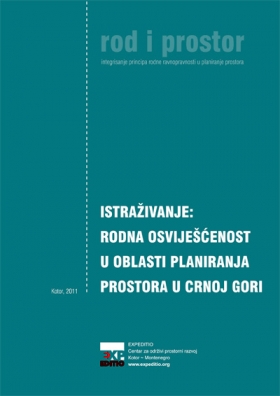
Research: "Gender awareness in the field of spatial planning in Montenegro" aims to examine the extent to which planning in Montenegro is gender-sensitive and how it can improve the current planning practice. The study was conducted with protagonists who operate in the field of planning and it involves attitudes about the current integration of gender equality in the space planning area, as well as guidelines and recommendations for improving the current situation in this field.
Gender equality implies equal participation of women and men in all spheres of public and private sector, equal status and equal opportunities to exercise all rights and freedoms and the use of personal knowledge and skills for the development of society, as well as the achievement of equal benefit from the results of their work.
Spatial planning creates a framework for all our activities. Today it is required that planning is integrated, that it simultaneously involves different segments of development. One of these segments is achieving gender equality - contribution to the promotion of equal opportunities, while respecting the experiences of women and men. A gender - sensitive planning is increasingly becoming the practice in today's concept of planning, and so should be in Montenegro.
The study: "Gender awareness in the field of spatial planning in Montenegro" aims to examine the extent to which planning in Montenegro is gender - sensitive and how it can improve the current planning practice. The survey was conducted through interviews with protagonists who work in the field of planning in Montenegro and it includes:
- views on the current inclusion of gender equality in the spatial planning process in Montenegro;
- guidelines and recommendations for improving the current situation;
The general picture of the situation, which stems from the research, is that planning in Montenegro is not gender - sensitive. Protagonists who operate in the sector of planning, the very notion of "gender equality" is less associated with planning practice, and more with the private sphere. In this sense, all the protagonists agree that in Montenegro, gender stereotypes are still alive and that changes are needed. Also agree that gender equality is both social need and obligation of the European Union. All the respondents noted that women have the same rights and obligations as men, but that are not paid equally and that do not come easily to management positions. With the term "gender - sensitive planning" is familiar only 12 % of respondents.
All interviewees stated that, in relationships at work, when it comes to male colleagues, they feel, generally, equal and respected. Unlike relationships with colleagues, experiences with men clients/customers, investors and decision-makers were for them more often discriminant.
When it comes to the number of women in planning practice, all interviewees recognize that there are plenty of women in places where they develop and implement plans, while men are still dominant in places where they invest and make decisions, that is, where there are money and power. "Planning is an interesting zone of men. Clients, property owners, are men and bigger demands are coming from them, plans are adopted by men, and also there are more men in the committees that evaluate planning documents", is one of the reflections.
As far as the approach to planning, research shows that planner women see certain differences in planners' attitudes of men and women. They find that women agree earlier that some space should be preserved, they rely on secure solutions and profession, they are more professional and they think a lot more responsible. They feel that men do not have such a fear of responsibility, their attitude to problems is operational, they plan as "an investor seeks" and they mutually have more solidarity of women.
When it comes to involving citizens, the usual models of involvement are public hearings and surveys . Analysis of citizens comments shall not be made in regard to the sex, and men have a far more public hearings when giving comments on planning documents.
Recommendations for improving the gender perspective planning practice are given at the end of this document. Guidelines were collected during the investigation, through the aforementioned interviews with protagonists who work in the field of planning in Montenegro. Recommendations include some of the ideas from the workshop "Gender and Space", organized as part of the project, as well as the sum of experiences gathered from literature. Guidelines and recommendations are intended for Secretariat for Urban planning and development in the local self-governments in Montenegro, the Ministry of Physical Planning and Environment (acctual Ministry of Sustainable Development and Tourism), companies engaged in developing of planning documents as well as non-governmental organizations active in the field of space, involving citizens, advocacy, women's rights, etc.
-------
We wish to thank to:
- All participants in the study and the workshop "Gender and Space" ;
- Prof . Anita Larsson (Lund , Sweden) for assistment in the creation of the Guide for the interview and recommendations related to literature ;
- Ministry for Human and Minority Rights, Department of Affairs of gender equality, for the given materials ;
- Donors who made possible the realization of the project "Gender and Space" - the Swedish International Development Cooperation Agency (SIDA ) and the United Nations Development Programme - UNDP.
The study can be downloaded here.

